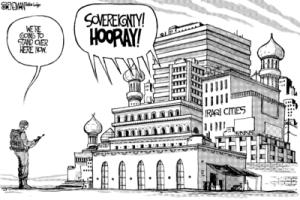- MENU
- HOME
- SEARCH
- WORLD
- MAIN
- AFRICA
- ASIA
- BALKANS
- EUROPE
- LATIN AMERICA
- MIDDLE EAST
- United Kingdom
- United States
- Argentina
- Australia
- Austria
- Benelux
- Brazil
- Canada
- China
- France
- Germany
- Greece
- Hungary
- India
- Indonesia
- Ireland
- Israel
- Italy
- Japan
- Korea
- Mexico
- New Zealand
- Pakistan
- Philippines
- Poland
- Russia
- South Africa
- Spain
- Taiwan
- Turkey
- USA
- BUSINESS
- WEALTH
- STOCKS
- TECH
- HEALTH
- LIFESTYLE
- ENTERTAINMENT
- SPORTS
- RSS
- iHaveNet.com
by Alex Kingsbury

U.S. forces are leaving Iraqi urban centers, but will militants retake control?
Militants in Iraq staged a series of bomb and machine gun attacks in the past ten days that left more than 250 dead and the country on edge.
The spasm of violence comes on the eve of two pivotal events, the withdrawal of U.S. forces from urban centers and the distribution of major oil contracts, both of which are due to be completed this week.
Increased carnage as the U.S. forces prepare to depart was not unexpected, American and Iraqi officials say. But, they note, the level of bloodshed has not returned to past highs. The new American envoy to the region, Christopher Hill, said that despite the violence, there's no evidence to show that insurgent militias are making a comeback.
But the latest uptick is a reminder of how perilous Iraq's security situation remains.
By the first of July, U.S. troops will be allowed to leave their compounds and enter cities to intervene in violent clashes only if Iraqi authorities request the help. That arrangement is a condition of the security pact between Baghdad and Washington. All U.S. forces, meanwhile, are slated to be out of the country by the end of 2011.
In reality, the withdrawal of troops from the cities has been underway, even largely completed, for several months.
In the once deadly Anbar province, U.S. forces withdrew from cities like Ramadi and Fallujah months ago and have transitioned to joint patrols with their Iraqi counterparts. The U.S. moves have been welcomed by the central government, with Prime Minister Nouri al-Maliki calling the pullout a "great victory." The British military, which was responsible for much of southern Iraq, formally ended all combat operations at the end of April.
In other places, Iraqi leaders have agreed to compromises.
Camp Victory, for instance, a sprawling complex of neighboring camps home to several thousand troops, is located only a few minutes' drive from the center of the capital. It's technically within Baghdad's municipal limits, but the Iraqi government has agreed to exempt it from the withdrawal accord.
In the violence-plagued northern city of Mosul, meanwhile, U.S. commanders are in the midst of last-minute negotiations to keep some of their forces in place to continue the fight against insurgents. "I'm hopeful about the withdrawal but biting my nails as well," says Noah Feldman, an Iraq expert at the Council on Foreign Relations.
The end of the month will see another critical decision that will weigh heavily on Iraq's future. Eight large oil and gas contracts, the first issued since the 2003 U.S. invasion, are up for auction by the government. The distribution of the country's bountiful oil wealth has long been a point of contention among the Shiite-led central government, the Sunni minority, and the Kurdish population in the north. The Kurds have already threatened to "totally reject" the deal unless it is ratified by parliament, a condition the Oil Ministry opposes. With perhaps as much as $1.7 trillion at stake in the next two decades, the dispute could fuel renewed violence, officials fear.
Providing security in the wake of the U.S. departure and continuing to rebuild the nation's shattered infrastructure will be two of the most immediate challenges that the young Iraqi democracy will face.
In central Baghdad, meanwhile, withdrawing U.S. forces are dismantling iconic concrete blast walls that once separated warring neighborhoods. Removal of the barriers, which were intended as a temporary security measure, is a hopeful sign. But should violence flare up, they can be put back as quickly as they were taken down.
WORLD | AFRICA | ASIA | EUROPE | LATIN AMERICA | MIDDLE EAST | UNITED STATES | ECONOMICS | EDUCATION | ENVIRONMENT | FOREIGN POLICY | POLITICS
Iraq | Violence Spikes as U.S. Troops Withdraw From Iraq's Cities